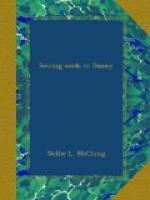A lamp was burning in the office but no one was in. It seemed a month ago since he had been there before. The air of the office was close and stifling, and heavy with stale tobacco smoke. Tom sat down, wearily, in the doctor’s armchair; his heart beat painfully—he’ll be dead—he’ll be dead—he’ll be dead—it was pounding. The clock on the table was saying it too. Tom got up and walked up and down to drown the sound. He stopped before a cabinet and gazed horrified at a human skeleton that grinned evilly at him. He opened the door hastily, the night wind fanned his face. He sat down upon the step, thoroughly sober now, but sick in body and soul.
Soon a heavy step sounded on the sidewalk, and the old doctor came into the patch of light that shone from the door.
“Do you want me?” he asked as Tom stood up.
“Yes,” Tom answered; “at once.”
“What’s wrong?” the doctor asked brusquely.
Tom told him as well as he could.
“Were you here before, early in the evening?”
Tom nodded.
“Hurry up then and get your horse,” the doctor said, going past him into the office.
“Yes, I thought so,” the doctor said gathering up his instruments. “I ought to know the signs—well, well, the poor young Englishman has had plenty of time to die from ten in the evening till four the next morning, without indecent haste either, while this young fellow was hitting up the firewater. Still, God knows, I shouldn’t be hard on him. I’ve often kept people waiting for the same reason and,” he added grimly, “they didn’t always wait either.”
When Tom and the old doctor drove into the yard everything was silent. The wind had fallen, and the eastern sky was bright with morning.
The old dog who lay in front of the granary door raised his head at their approach and lifted one ear, as if to command silence.
Tom helped the doctor out of the buggy. He tried to unhitch the horse, but the beating of his heart nearly choked him—the fear of what might be in the granary. He waited for the exclamation from the doctor which would proclaim him a murderer. He heard the door open again—the doctor was coming to tell him—Tom’s knees grew weak—he held to the horse for support—who was this who had caught his arm—it was Pearl crying and laughing.
“Tom, Tom, it’s all over, and Arthur’s going to get well,” she whispered. “Dr. Clay came.”
But Pearl was not prepared for what happened.
Tom put his head down upon the horse’s neck and cried like a child—no, like a man—for in the dark and terrible night that had just passed, sullied though it was by temptations and yieldings and neglect of duty, the soul of a man had been born in him, and he had put away childish things forever.
Dr. Clay was kneeling in front of the box cleaning his instruments, with his back toward the door, when Dr. Barner entered. He greeted the older man cordially, receiving but a curt reply. Then the professional eye of the old doctor began to take in the situation. A half-used roll of antiseptic lint lay on the floor; the fumes of the disinfectants and of the ansthetic still hung on the air. Tom’s description of the case had suggested appendicitis.




